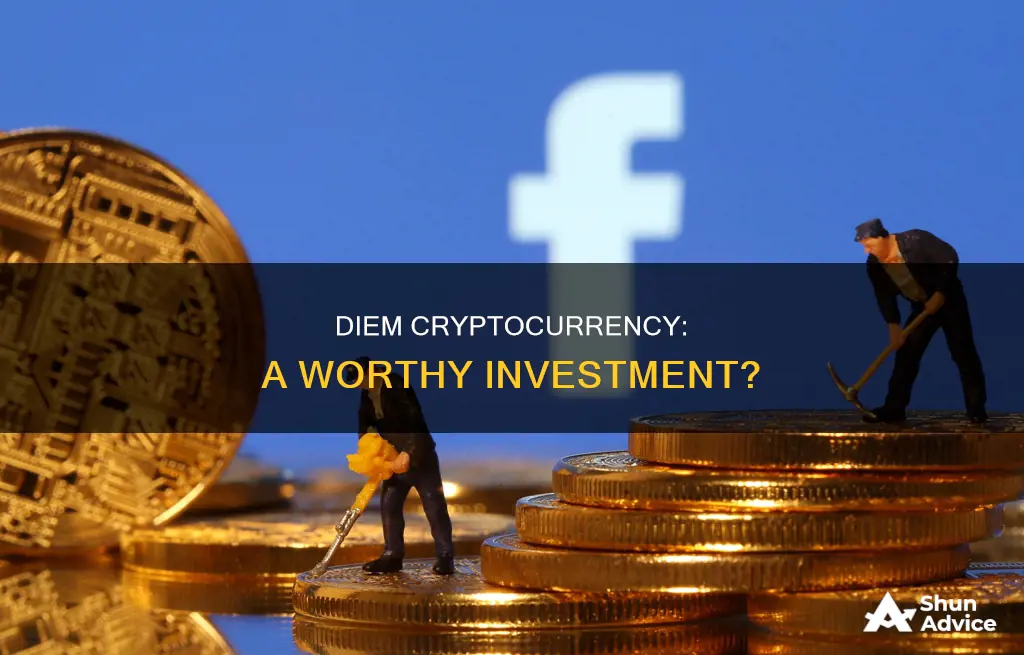
Diem, formerly known as Libra, is a blockchain-based stablecoin payment system proposed by Facebook. The project was managed by the Diem Association, a membership organisation of companies from various industries, including payment, technology, and telecommunications. The idea behind Diem was to create a fast, secure, and borderless money transfer mechanism using blockchain technology. While the project faced regulatory pushback and opposition from lawmakers, it has the potential to revolutionise the cryptocurrency landscape by providing Facebook's billions of global users with access to blockchain services. With the recent sale of its intellectual property and assets to Silvergate Capital Corporation, the future of the Diem project remains uncertain.
| Characteristics | Values |
|---|---|
| Original Name | Libra |
| Original Launch Date | 2020 |
| Creator | |
| Current Status | Sold to Silvergate Bank |
| Current Owner | Silvergate Capital Corporation |
| Current Name | Diem |
| Purpose | To create a fast, secure, and borderless money transfer mechanism |
| Target Audience | 1.7 billion adults without bank accounts |
| Regulatory Concerns | Monetary sovereignty, financial stability, privacy, and antitrust concerns |
| Regulatory Bodies Concerned | European Union, USA, and other countries |
| Backers | Visa, Mastercard, PayPal, Uber, and others |
| Regulatory Approval | Not approved by the US government |
| Advantages | Instant adoption, fast transactions, secure, transparent, global reach |
| Disadvantages | Regulatory pushback, loss of backers, competition with the global fiat market |
What You'll Learn

Diem's potential for fast global adoption
Diem, formerly known as Libra, is a blockchain-based stablecoin payment system proposed by Facebook. The project was managed by the Diem Association, a membership organisation of companies from payment, technology, telecommunication, online marketplace, and venture capital, and nonprofits.
Diem has the potential for fast global adoption due to several factors:
Facebook's User Base
Facebook has billions of global users, and the launch of Diem would instantly turn all these users into cryptocurrency users. This would help educate people about the benefits of blockchain technology and increase the adoption of cryptocurrencies.
Network Effects
Diem's large network of users would also attract numerous developers to the platform. Dapp developers could leverage Diem to create new and exciting fintech applications with instant access to a vast crowd of potential users. This would create a vibrant ecosystem of applications and services built on Diem, further enhancing its adoption and attractiveness to users.
Speed and Security
Diem is designed to enable fast, secure, and low-cost transactions. Both consumers and businesses can conduct instantaneous and highly secure transactions using this network. The ability to send payments internationally in seconds would make Diem a convenient and attractive option for users and businesses alike.
Regulatory Compliance
Diem has been designed with regulatory compliance in mind. It addresses concerns such as money laundering and sanctions risks by prohibiting anonymous transactions. The project has received positive feedback from regulators, including a senior regulator in the United States who called it the "best-designed stablecoin project" they had seen. This regulatory compliance increases the likelihood of widespread adoption as it addresses concerns raised by lawmakers and regulatory authorities.
Ease of Integration
Diem is designed to be easily integrated into the daily lives of users. The Novi wallet, for example, will be included in the Facebook Messenger and WhatsApp networks, making it convenient for users to send and receive payments. This seamless integration with existing platforms could accelerate the adoption of Diem among Facebook's user base.
Coinbase Investment: A Beginner's Guide to Getting Started
You may want to see also

Regulatory challenges
Diem, formerly known as Libra, was a blockchain-based stablecoin payment system proposed by Facebook. The project was managed by the Diem Association, a membership organisation of companies from payment, technology, telecommunication, online marketplace, and venture capital, and nonprofits.
The Diem project faced significant regulatory challenges and opposition from government regulators and lawmakers in various countries, including the European Union and the United States. Regulators expressed concerns about the potential impact of for-profit tech firms issuing currencies, as well as issues related to monetary sovereignty, financial stability, privacy, antitrust, and money laundering.
In the United States, the House Financial Services Committee held a hearing where members of Congress raised concerns about Facebook's involvement in election meddling and disinformation campaigns. Regulators also questioned the classification of this new type of currency and which branch of the government would oversee its operations.
As a result of the regulatory pushback, the project lost major backers, including Visa and Mastercard, and Facebook's role in the project was reduced. The Diem Association also faced legal challenges over the use of the name and logo, which were already in use by other companies.
Despite Diem's efforts to address regulatory concerns and its receipt of positive feedback on its network design, federal regulators ultimately blocked the project from moving forward. This led to the sale of the Diem Group's assets to Silvergate Capital Corporation in 2022.
Webull's Guide to Bitcoin Investment
You may want to see also

Diem's security and transparency
Diem, formerly known as Libra, was a blockchain-based stablecoin payment system proposed by Facebook. The project was managed by the Diem Association, a membership organisation of companies from payment, technology, telecommunication, online marketplace, venture capital, and nonprofits.
- Consumer Protection and Compliance: Diem prioritised consumer protection and compliance with regulations. The association planned to create a payment system that complied with relevant laws, safeguarded consumers, and supported efforts to combat money laundering, terrorism financing, and other illicit activities.
- Controls and Prohibitions: Diem implemented industry-leading controls to protect consumers and combat financial crime. One notable control was the prohibition of anonymous transactions, addressing both sanctions and money laundering risks.
- Collaboration with Regulators: Diem actively sought feedback from governments and regulators worldwide. The project evolved and improved based on this dialogue, addressing regulatory concerns. A senior US regulator praised Diem as the best-designed stablecoin project the US government had seen.
- Blockchain Technology: The Diem network was built on blockchain technology with security as a key consideration. Blockchain's distributed ledger technology enhances security and transparency by providing an immutable record of transactions.
- Permissioned Blockchain: Unlike permissionless blockchains used by some cryptocurrencies, Diem employed a permissioned blockchain. This meant that only members of the Diem Association could process transactions, adding an extra layer of control and security.
- Addressing Regulatory Concerns: Diem faced significant regulatory challenges, particularly regarding monetary sovereignty, financial stability, privacy, and antitrust concerns. In response, the project scaled back its initial plans and worked to address these concerns.
- Stablecoin Approach: Diem's stablecoin design was backed by a reserve of assets, including cash, cash equivalents, and short-term government securities. This approach aimed to mitigate volatility and provide stability to the cryptocurrency.
- Open-Source Protocol: The Diem protocol was open-source, fostering a community of developers who could contribute to the network's security and transparency. This approach allowed for collaborative advancements and greater scrutiny of the underlying technology.
While Diem faced regulatory obstacles that ultimately led to its demise, the project consistently emphasised its commitment to security and transparency. The association worked closely with regulators and implemented robust controls to address concerns related to financial crime and consumer protection.
Dimcoin Investment: A Beginner's Guide to Getting Started
You may want to see also

The Diem Association
Diem Association members included businesses and non-profit organisations. Notable members included Andreessen Horowitz, Shopify, Coinbase, and Spotify.
In January 2022, it was reported that the Diem Association was winding down, and its assets were sold to Silvergate Bank for a reported $200 million. Silvergate wrote off their Diem investment in January 2023.
A Beginner's Guide to Investing in Bitcoin in India
You may want to see also

The Diem dollar
The Diem Association, which manages the project, has stated that the Diem payment system will be accessible to anyone with an entry-level smartphone and data connectivity. It will facilitate a more accessible, more connected global financial system, providing people everywhere with access to safe and affordable financial services.
The Diem network is built on blockchain technology, with a focus on security. The Diem blockchain serves as the technical foundation of the token and is used to verify transactions and ownership. The blockchain was custom-built to service the needs of billions of network users, with an emphasis on security and compliance.
The Diem Association has also developed the Novi wallet, which allows users to store multiple currencies, including major fiat and digital currencies. This move demonstrates the Association's commitment to promoting the digitization of the economy, rather than a Facebook takeover.
Cryptocurrency Investment: Risks and Rewards
You may want to see also
Frequently asked questions
Diem (formerly Libra) is a blockchain-based stablecoin payment system proposed by Facebook. It was intended to be a universal currency linked to a basket of sovereign currencies such as the US dollar and the euro.
Facebook wanted to create a simple global payment system and empower billions of people who don’t have access to traditional financial systems. Zuckerberg also acknowledged that allowing people to use cryptocurrency would most likely benefit Facebook by making advertising on the social network more desirable and, thus, more expensive.
The Diem project faced immediate regulatory pushback from politicians and lawmakers. Regulators voiced concerns about the effects of for-profit tech firms issuing currencies. Diem also faced criticism and opposition from central banks. The Diem Association sold its intellectual property and assets related to the Diem Payment Network to Silvergate Capital Corporation in 2022.
Diem never launched as a cryptocurrency, so it has no market cap or price. Silvergate, the company that acquired Diem, is working on its own stablecoin, which will be tied to the US dollar. Whether or not you should invest in Silvergate's stablecoin depends on your risk tolerance and investment goals. While stablecoins are generally seen as less volatile than other cryptocurrencies, all investments come with inherent risks, and cryptocurrencies can be riskier than some traditional investments.







